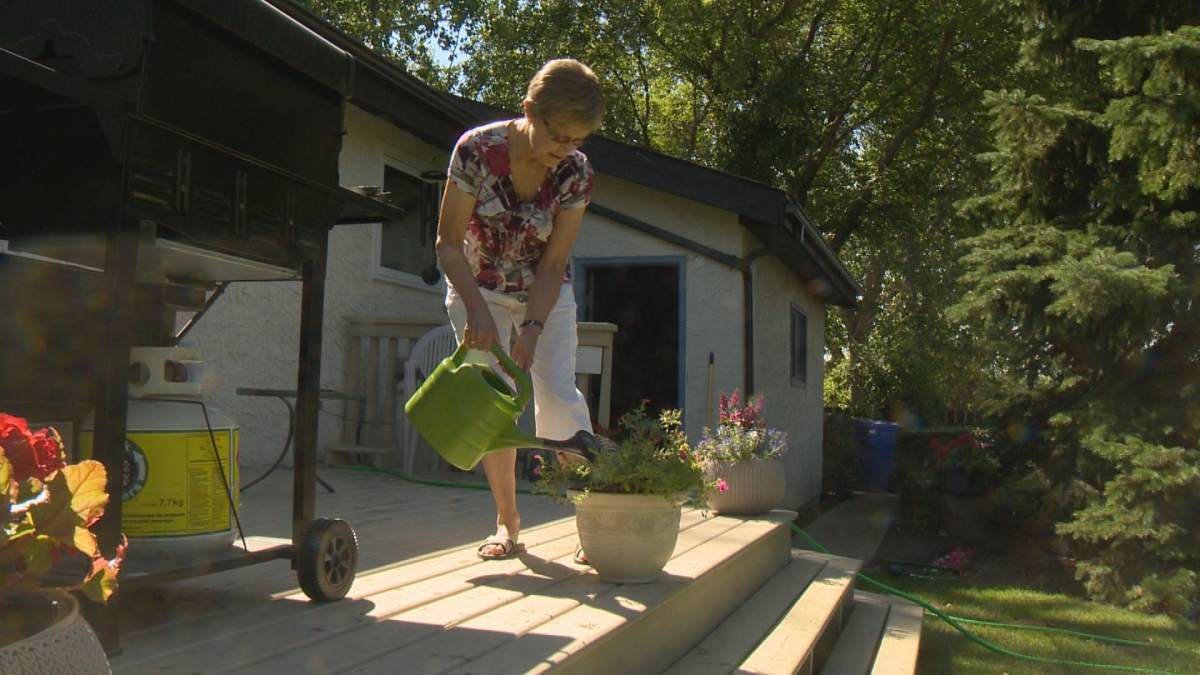Judy Fielden is a retired nurse who likes to spend her summer in the garden and travelling between Alberta and Ontario to visit her grandkids.

Two years ago, her summer ended with unfortunate news.
“I was diagnosed with ovarian cancer in September of 2015, over the Labour Day weekend. A surprise to me, because I wasn’t really that sick,” she said.
Fielden beat the disease last year, but the fight wasn’t over yet. Her cancer returned in December. The 73-year-old completed her latest round of chemotherapy in May, and for now it’s a matter of regular checkups.
Fielden has her eye on another treatment avenue; a new drug called Lynparza. However, it’s not covered anywhere in Canada.
“It’s very frustrating,” she said. “There are very few options available for women with this disease, and that has not changed in the last 20-40 years.”
On average, 75 women are diagnosed with ovarian cancer each year, and 55 die annually.
READ MORE: Simple CT scan shows responsiveness to ovarian cancer treatment: Researchers
Lynparza is designed to be a therapy treatment for women with BRCA-mutated ovarian cancer. BRCA is a gene deviation that makes women more prone to breast and ovarian cancer.
The drug has received approval from Health Canada, however it did not receive a recommendation from the pan-Canadian Oncology Drug Review (pCODR). The panel cited insufficient evidence, and asked for more data.
Because of this, Darryl Boehm, Sask. Cancer Agency Pharmacy Services provincial manager, said that the province will not cover Lynparza for the time being.

Get weekly health news
“So we’ve always waited for the pan-Canadian Oncology Drug Review recommendations, before making a decision to list a drug on our formulary,” he said.
Drugs on the formulary are provided to cancer patients free of charge.
As a new cancer drug, Lynparza does not come cheap. It costs an estimated $8,000 per month for one patient, or around $90,000 annually. Boehm said the average cost for a year’s worth of drugs across all cancers is $7,000.
Lynparza is will be reviewed by pCODR again at the end of August. If it is recommended for use, the cost may go down.
“If the recommendation is there’s net clinical benefit, but it’s not cost effective, it goes to a price negotiation set up by the provinces called the pan-Canadian Pharmaceutical Alliance,” Boehm explained.
If a contract is established, the provinces would be able to start providing Lynparza, but that could still be months away.
This is where Fielden’s frustration comes from. Lynparza is already used in 45 countries, including the United Kingdom and Australia.
“Here is an opportunity with a new treatment, a new drug, that can potentially help people live longer, lengthen our lives, and we’re lagging behind,” she said.
Ovarian Cancer Canada (OCC) is also advocating for the drug’s approval. OCC regional director Stephanie Gosselin said a potential treatment like this is overdue.
“It’s a disease where the outcomes for it haven’t really changed in the last 50 years,” Gosselin said.
“There isn’t really a whole lot of treatments available, so when one does come to the forefront it’s really important that women and patients have access to that.”
Those outcomes are not good. According to OCC, 56 per cent of women who are diagnosed with ovarian cancer do not survive past five years. Those who do have an 85 per cent chance of the disease recurring.
READ MORE: LHSC Foundation receives $5M donation to support ovarian cancer research
While pCODR goes over Lynparza once again it may be available to some patients. The Saskatchewan Cancer Agency recently received a letter from the manufacturer, AstraZeneca, saying eligible women can receive Lynparza free of charge if they do not have private insurance.
However, Fielden is not one of those eligible women. She has been told she would need to undergo another round of chemo before she’d be considered a candidate for Lynparza.
“The reason I’m advocating for it now, and very strongly, is I would like it in place if and when I need it. Not to start fighting when I need it,” Fielden said.









Comments